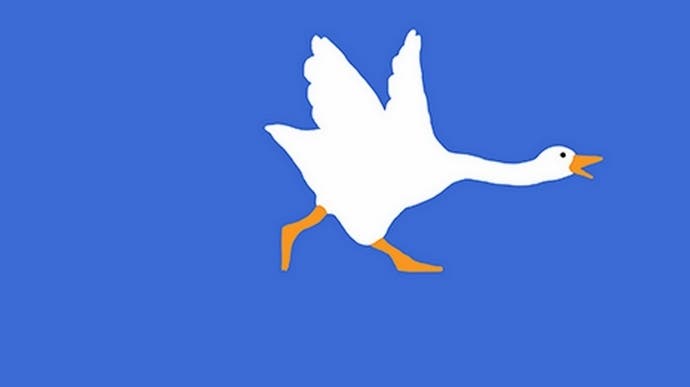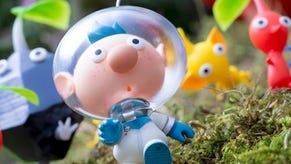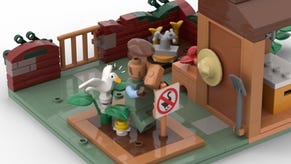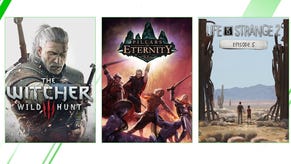What stand-up comedy can teach games
Sit-down laughs.
People love to laugh. Laughing is fun, it brings people together, some even say it's medicinal. People love laughing so much that I'm often paid to stand up in a dark room telling jokes to strangers.
After a night attempting to make people laugh (and sometimes hideously failing) one of my favourite things to do is play video games. And I've started to think recently: why so serious? Wouldn't a bit of humour liven things up, maybe even make things more believable and relatable?
It's not that easy, of course. If all it took was someone saying 'just be funnier', then I'd be filling stadiums. But maybe some of the same rules that a lot of us use in stand up are transferable.
Rule number one for the stand up comedian is to be relatable. Even the best surreal comics need their audience to relate and connect, so a touch of authenticity is vital. I get it: it's tricky to find authentic truth when writing about battle hardened space marines fighting aliens on ring-worlds that double as planet destroying super-weapons. But make those space marines have indigestion before they get dropped into a warzone? That's relatable. It's going to make people care more about those marines.
Just as important is to make every word count. Comedy writing is about being as funny as possible as quickly as possible: if it ain't funny or helping set things up, it's out. Clutter a game with stuff that isn't fun or engaging, it's gotta go.
I chatted to human man Alasdair Beckett-King, (eccentrically humble, he insisted I called him that even though he's a fantastic comedian and creator of the point and click adventure game Nelly Cootalot - don't tell him I told you). He explained that when writing soundbites, or 'barks', it can be hard coming up with more than one way of saying 'it musta been a squirrel'. Some video game writers, he went on to say, write barks 'which tell me nothing about the world, the character and doesn't make me laugh. It's great building worlds and character but if you can't do either, then if you make a joke you've at least not wasted the players time.'
A game that does this well is Psychonauts. At one point you dive into the mind of Linda the Lungfish and are transported to a small city whereupon you become Googlor, a Godzilla-like creature. Crushing buildings and scaring the populous, it's basically one big parody of kaiju movies. You hear an NPC shout "no wait he's still heading for the orphanage" before realising, to his horror "it was the orphanage for dogs, it was the puppy orphanage everyone!" This bark works great as it 1) Helps with world building (I, Googlor, am destroying things and having an impact on this city) 2) Tells me about the characters (this guy has a soft heart and loves puppies) 3) Creates a laugh by offering ridiculous stakes (a puppy orphanage).
By parodying kaiju movies, Psychonauts walks a fine line: go too niche and the joke falls flat as your audience won't know what you're talking about. Too broad and there's no thrill or tension. Untitled Goose Game does this well. A parody of stealth games, it juxtaposes the serious stakes of sneaking around with the low stakes of a goose and BOOM: ridiculous and funny. But crucially, the joke of this game never gets in the way of the game itself.
Goose game is funny, but it's a stealth game at its core. I'm reminded of stand up where I don't want a punchline to break the illusion I've tried to create. That part has to work first so everything else does. I've played games which try to parody tropes with characters rolling their eyes at an 'ironic' fetch quest. While this can be funny, lean on it too much and it takes me out of the experience. Having annoying mechanics just to make the point that these cliched mechanics suck isn't worth it - better to ditch it and find a gag elsewhere.
The coolest - and hardest - thing about stand up comedy is its immediacy. You write a joke, try it out and people laugh (or heartbreakingly they don't). You re-work the bits and try it again. While games might not be able to perform their best bits to an audience they might be able to borrow something else from the world of comedy: writers rooms.
The creators of 'Life Is Strange' adopted this technique when trying to find the right 'voice' for their characters. With more than one person working the script people spot gaps that a single writer might not see. This happens all the time when I write jokes, I write something I think is genius, one that I'll be remembered for only for it to be absolute nonsense and make me look crazy. So I run it past other comedians to see if they make sense. A fresh perspective always helps when you've been stuck behind a laptop for months trying to make jokes about what a character says if you click on a coffee mug. If it feels sticky get more than one person to look at it. Comedy can't exist in a vacuum.
Not every game has to be hilarious. When designing a game, triple-A studios are probably asking 'will it sell?', not 'are my characters farting'? But a little bit of humour goes a long way. Treat it like seasoning - a dash here to make you're world feel real, a funny line there to make your protagonists more likeable.
That's it! Easy, right? Just be funnier.










